
A Classic Adaptation, Filled With All The Beloved Tropes...
Along with its international cousins Boys over Flowers and Hana Yori Dango, and the recent eponymous 2018 version, Meteor Garden (2001) is often seen by international fans as one of the most “essential” and “ classic” versions out there . With the talents of Barbie Hsu as our female lead Shan Cai, Jerry Yan as our brooding male lead Dao Ming Si and Vic Chou as our second male lead Hua Ze Lei, it is no surprise that the Taiwanese version captivated a whole generation of youths by prominently kick-starting the drama adaptations with its own flare.The storyline is fairly familiar for those who have watched the previous versions ; poor girl Shan Cai and rich boy Dao Ming Si turn from enemies to lovers at a prestigious university. Rich boy Si is the leader of the clique F4 (Flower Four) and routinely bullies students who irritate him . Poor girl Shan Cai stands up for a friend and receives the dreaded red card (signal for the student body to bully a person) and surprises everyone when she does not back down from the repeated bullying incidents. Instead, Shan Cai declares war on the F4 earning their respect and rich boy Si’s affection alongside the interest of second male lead Ze Lei .
Yet like all of the adaptations, Meteor Garden still prominently has many things it did better than other versions and elements which weren’t as well tackled, either. Perhaps the most notable elements which still stand strong across all the versions are centralised upon the decision to “ age-up” the characters in comparison to most of their counterparts ( sans the recent Chinese version) , the more well-rounded complexity of Ming Si as a character and the interactions between Shan Cai and Ming Si feeling often a lot more “ natural” than other versions.
For those who may be unaware, most of the adaptations centralise the romance between the female lead and the male lead in high school. Although this has led many of the adaptations to explore more mature themes than typical “ sugary teen” dramas, it often felt questionable towards the exact nature of some of these themes in a high school setting. Perhaps to avoid as much controversy as well as being able to explore these themes for a more mature audience, Meteor Garden made the prominent decision of “ ageing-up” characters as university students allowing elements of the show to seem more natural within a young adult environment, rather than an immature teen high-school setting .
In addition to these themes of maturity and complexity, it still remains striking that out of most of the versions,
Jerry Yun arguably did possibly one of the best portrayals of making Daoming Si, a nuanced character. Yun is able to channel a level of complexity to his character than the “ stock comedy figure” taken in many versions . Frustratingly, he’s never given a chance to reconcile for some of his actions, but he’s still ultimately a well-rounded male lead; imperfect and often despicable at times , yet still a lot more than meets eye.
Parallel to Yun, Barbie Hsu is a refreshing change from the typical “ spineless” female lead in previous adaptations. Shan Cai is fierce, strong and able to determine her own wants and desires over the course of the series, leading her to maturely develop her relationship with Dao Ming Si from rivalry to close contact. Yet, as much as Barbie Hsu is undeniably a good actress,her acting skills did often come off as a little wooden in this adaptation, often resulting in some cheesy line deliverances and acting moments. In addition to this, a prominent complaint which may arise for modern day viewers is that ‘ Meteor Garden’ often normalised many scenes of physical abuse ( slapping and inappropriate touching ) against the female lead, which were neither raised nor touched upon as an “issue”.
The next prominent character to touch upon is Vic Chou’s role as the second male lead Zei Lei. It is often striking for a character who followed his manga version prominently ( not least touching upon the character having autism), Lei seemed a little lacklustre in comparison to his other counterparts. This is prominently because there’s little motivation or defining personality traits given to Lei which make him stick out or root him for prominently as a character. In Hana Yori Dango, Rui was mysterious and cool often leading to his true feelings being in the dark for viewers when it came to the female lead , in Boys Over Flowers, Ji Hoo was kind-hearted and even in the recent Chinese version, Lei is shown to be more evident within his motives for chasing Shan Cai. Yet in the Taiwanese version, his reasoning and personality often felt half-baked and consequently more of a “ stock” male lead, than an individual.
Additionally , it’s important to not gloss over the fact that Meteor Garden has all the shortcomings you’d expect from a drama of this bygone era — the music is inappropriate at times , it looks and feels outdated and its production values are bargain basement for a series ironically focusing upon the lavish and affluent upper-class members of Taiwanese society.
It’s probably fair to say that although every Hana Yori Dango adaptation is based on the same source material, it is outstanding how different the final products are and Meteor Garden is no exception . It is ultimately dated by fashion, age and certain tropes, but out of all the versions, still probably remains one of the most well-written in terms of the character bond between Shan Cai and Si of all the versions. Nevertheless, Meteor Garden’s ultimate flaws can additionally be found through pacing ( which ultimately snags at times before the interference of Si’s mother in the storyline), poorly written-tropes and questionable characterisation. Arguably still one of the best versions from the series, but not flawless.
Was this review helpful to you?
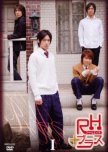
This review may contain spoilers
A Sugary Sweet Vampire Drama
RH Plus was a show filled with a level of sugar sweet high school tropes, which undeniably left more questions than answers by the ending of the drama. In the beginning of the drama, the show focuses upon Makoto moving into a new residence , revealing that everyone ( including himself ) are all secret vampires. Now, the one thing which I did always feel as though this show could’ve gone into more depth around is the existence of vampires outside of the mansion. Whilst the script writers did have the benefit of being able to focus upon the centralised lives of Makoto and the other residents, there were many elements from the pasts of the characters which felt disjointed within the show, particularly the secret revelation behind Makoto’s parentage and of course, the head, Kiyoi’s past as the oldest vampire well. The latter, ironically being a major part of the series, however, there was little reason or explanation as to why Makoto’s mother and father ended up together in the first place and of course, why both parents made their decisions in the plot as well which would of course influence Makoto’s mental state for a major proportion of the series. This leads us to the next biggest problem . The unanswered questions. Naturally, a show can go through never answering these questions for viewers, however, there was little actual indication towards a sense of emotional appeal or relatability with most of the characters. Not least is the parentage of Makoto never truly brought to light in the series or shown to actually affect Makoto after the revelation, but, there are also so many questions regarding Makoto ‘s abilities as well which didn’t feel disclosed for viewers. Similarly, it would have been just as intriguing to have known more about Kiyoi’s past especially his path to vampirism. This leads us to another big snag in the series. How are vampires created? Now, this more of a general nag than anything else, but it felt a little annoying as to the fact that none of the characters were exposed towards if they had been presumably human or vampires their entire lives. Presumably, they were human once from Kiyoi’s comments, however, this also would lead to the more moral questions such as the youngest Ageha, and how these characters dealt with the pain and heartbreak of having to leave their human lives behind, something which just was dealt with at all in a show about vampires.Was this review helpful to you?

Skate Our Souls Will “ Save” Your Soul From Typical Idol Dramas...
There’s no denying that Project ; Skate Our Souls does have a certain “idol” teen quality within casting a fairly “ good looking” and a “ young” actor such as Teeradon Supapunpinyo ( renowned for his roles in Hormones 2 and 3) to play our main character, a depressed high school student referred to as Boo throughout the series.Yet rather than playing upon his looks alone, Supapunpinyo’s appearance is fairly unrecognisable ; from clothes chosen by the stylist to hang loosely upon his frame to a buzz cut hairstyle accompanying his fatigued appearance, Supapunpinyo truly seems to step into his role throughout the series as a teen struggling with depression.
Yet contrary to the the unassuming appearance of Supapunpinyo as Boo, Toni Rakkaen skates onto screen impressively as Boo’s senior and a pro- skater, Simon with a vivid array of wardrobe choices and hair which seems to channel his inner G- Dragon ( particularly from BIGBANG’s music video Fxxk it).
It is made evident for viewers that from his appearance alone during their first meeting , Simon is seemingly everything that Boo is not; confident, cocky and certainly a vivacious flirt with Boo’s kind-hearted and worried doctor and psychologist Bell( Chayanit Charnsangarvej).
This would seem to naturally draw the conclusion that the show will take the cliche route of trying to enforce
a strange and sudden “ fraternal” friendship between Boo and Simon over the course of the series , with the former suddenly trying to help Boo to overcome his depressive thoughts, get together with his younger sister Fern ( Narupornkamol Chaisang)and for everything in the end to become hunky dory.
Yet refreshingly unlike a lot of idol dramas which would take this route , Boo and Simon’s relationship is complicated between a mixture of teasing and later revelations which plays a greater role in later episodes. This was a surprisingly intriguing development between the characters as individuals (including Fern), rather than just mere plot devices to get the story to advance.
On the other hand, perhaps the one compliant which should be noted about this series,is that the film quality isn’t brilliant. Whilst this does add a sense of realism at times to being like a fly-on- the- wall documentary of a fictional character ( Boo) ‘s experiences , this sometimes did not help with portraying the emotion or depth of some scenes ( sometimes this often didn’t help with actually portraying the problems for Boo during his moments of “spiralling “ in the show). Additionally there’s no sugarcoating as well that whilst our cast is fairly good, there are a couple of lacklustre moments of acting also ( even from Supapunpinyo during some scenes of his interpreted role upon “ depression” ).
On a more positive note, however, one aspect of the show which must be praised is the portrayal of a complicated and progressive relationship between Boo and his father ( Tom Phollawat Manuprasert) . In several early episodes of the series, Boo’s father is shown to realistically not be able to quite grasp what’s “ wrong” with his son’s sudden slipping grades and weariness at home . Whilst most idol dramas would write this off as Boo’s father being “uncaring “ and a “ villainous” character, he’s actually revealed to love and care about his son over the course of the drama . This relationship is dedicatedly presented as complicated and surprisingly heartwarming even in the final episodes.
Overall Skate Our Souls was a surprisingly more realistic and refreshing portrayal of teenagers and youths in Asian dramas with an intriguing plot premise of friendship, development and genuinely likeable characters. Certainly worth dedicating time towards and watching if you want a break from typical “ sugarcoated” idol teen dramas.
Was this review helpful to you?
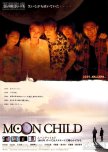
The Futuristic Vampire Gang Thriller, Which Failed To Deliver An Impactful Bite…
At the heightened craze of vampires flicks and blazing gun thrillers, notorious 1990s " pink film" co-screenwriter and director Takahisa Zeze decided to cash in both genres with ‘ Moonchild’ (2003); a 2 hour trope-worthy film filled with an intriguing premise and characters , as well an array of questionable acting performances and narrative execution.
The movie is set in an alternative timeline where in the year 2014, Japan begins to suffer from economic collapse. As a consequence, myriads of Japanese citizens emigrate to mainland China in order to escape economic ruin.
Set against the backdrop of the fictional ‘ melting pot’ Chinese town of Mallepa, the main narrative focuses upon a trio of orphaned boys. Sho ( Kanata Hongō- ‘ The Prince Of Tennis’, ‘ Nana 2’ and ‘ Himitsu no Hanazono’) is the head of the group, whilst his younger brother Shinji and Toshi are fellow members.
Shinji ends up landing the group in hot water when he steals a briefcase filled with money from a notorious hood gang. Fortunately, Shinji, Sho and Toshi are protected by the mysterious vagrant and later-revealed vampire Kei ( L'Arc-en-Ciel and Vamps’ vocalist Hyde- ‘ Last Quarter of the Moon’).
A time-skip several years into the future reveals Sho to be in his early twenties ( idol-actor and screenwriter Gackt- ‘ Tonde Saitama’, ‘ Sengoku Basara’ and ‘ Time Spiral’). Acting as the leader for his own small gang consisting of Toshi ( Yamamoto Taro- ‘ Battle Royale’, ‘ Secret Love’) and Kei.
However Sho ends up running into trouble along the way when he becomes acquainted with Song ( Wang Leehom - ‘ Love In Disguise’, ‘ Forever Young’) and his sister Yi-Che ( Zeny Kwok).
Whilst Sho ends up struggling between his growing feelings for Yi-Che, rising tensions between old friends and betrayals, Kei begins to struggle against trying to resist his bloodlust and vampiric urges also …
Co-written by director Takahisa Zeze, main actor Gackt and Kishu Izuchi, ‘ Moon Child’ attempted to combine the adrenal-infused thrill of shootout movies, sci-fi futuristic worlds, vampiric-horror flicks and pining romance tales in a movie which attempting to appease to everyone, often failed to deliver a cohesive narrative along the way.
Undeniably there are intriguing elements surrounding ‘ Moon Child’ behind the over-the-top makeup and idol clothing aesthetics of Gackt and Hyde onscreen.
Patchy elements surrounding Kei’s creator vampiric Luka ( Kishu Izuchi) were intriguing, the subtext and evident messaging towards an emerging Pan -Asian society ( particularly enforcing a timeless allegory towards the rise, virtues and flaws of fusion cultures, immigration and poverty in other countries) and the reiteration on the horrors of violence are prominent in parts of ‘ Moon Child’.
On the other hand ‘ Moon Child’ and its array of gun-wielding chic gangsters occupying the periphery of the storyline were often absent of cause, sentience and personal drive.
Sho’s seemingly " burning" feelings for main love interest and doe-eyed Yi-Che were tepid to say the least. Aside from some hinted causes of physical attraction, it seemed ironic that Gackt’s onscreen chemistry with costar Hyde was arguably more passionate than his character’s ” soulmate" and costar Zeny Kwok’s onscreen persona. (Often leading to a somewhat unintentional homoerotic subtext behind Kei and Sho’s interactions. Ironically, this relationship probably would’ve been more dynamic than the established lukewarm chemistry between Yi-Che and Sho.)
As suggested, Song is one of the main antagonistic forces in the series. However rather than being a merciless force to be reckoned with or possessing an ineffable charismatic charm for audiences to make him memorable, Song possessed only one quality; to act as a threat and then fizzle out as quickly as he’d appeared onscreen.
Of course Song isn’t the main focus of the narrative. However considering his role in later events of the storyline as well as the notable absence of foreshadowing or drawing attention for viewers towards his onscreen presence, Song was a notably generic antagonist due to his anti-climactic exit by the latter-half of the movie.
The acting performances of the series are admittedly a mixed-bag. It’s wrong to make out these performances were "dire" or entirely "egregious " in the long-run, but it could often become a grating experience for viewers to witness inconsistent line deliverances and acting performances onscreen.
As for the challenge of pacing, ‘ Moon Child’ could often misstep its execution- cramming multiple genres, storylines, constant time-skips and shifts even into a 120 minute film could often feel somewhat overblown. Whilst the narrative was able to attain a certain entertaining edge from
subverting it’s tedious opening to a pacy and adrenal-infused storyline, Zeze rarely placed emphasis upon the art of " less is more".
As a consequence rather than reducing the movie’s length or themes in order to subtly focus upon a limited yet insightful scope of plot and characters, ‘ Moon Child’ became entrapped in its own self-made Gordian knot of cutout cliches, archetypes and incoherent plot logic from beginning to end.
The cinematography of ‘ Moon Child’ under Zeze’s directing reigns is admittedly an odd accumulation of amateurish shaky angles and shots during epic fight sequences, as well as some surprisingly stunning and impactful symbols placing emphasis upon the old cliche of cyclical narrative symbolism.
‘ Moon Child’ is a classic reflection of the culture of throwaway 2000s productions. Whilst Zeze’s move could be entertaining in parts with a particularly bittersweet ending , ‘ Moon Child’ often felt as though it bit off more than it could chew at times. Choppy execution, inconsistent pacing alongside a potentially intriguing premise with a multitude of loose and messy plot ends rarely helped viewers to feel connected or involved with ‘ Moon Child’’s world building. The acting rarely possessed solid deliverance throughout and in between over dramatic line deliverances and dialogue, the generic array of characters rarely left an everlasting impression for audiences either. Overall whilst ‘ Moon Child’ isn’t a bad watch, the movie is easily overshadowed by its lacking definitive qualities also.
Was this review helpful to you?
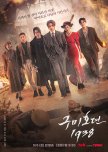
Tale of the Nine Tailed Fox 1938; An Action-Packed Sequel...
Tale of the Nine-Tailed Fox 1938 is the long-awaited and highly anticipated sequel to the 2020 series, Tale of the Nine-Tailed Fox. Following the adventures of gumiho, or nine-tailed fox, Lee Yeon ( Lee Dong Wook), the series uproots the modern setting to a time-travelling experience during the Japanese occupation. Lee Yeon and Koo Shin-joo (Hwang Hee) chase after a mysterious masked being that has stolen the Samdocheon Guardian Stone, a gem that maintains the barrier between the living and the dead. Stuck in 1938 until they can recover the stone, they encounter old friends, the former mountain deity and wealthy socialite Ryu Hong Joo ( Kim So Yeon), a hostile former friend and guardian spirit, Cheon Moo Young ( Ryu Kyung Soo) and Lee Yeon's younger brother, Lee Rang ( Kim Bum). Can Lee Yeon travel back to the future while saving the past from malicious entities, or will history be doomed to repeat itself?
The same screenwriter wrote The Tale of the Nine-Tailed Fox, the first series, Han Woo Ri, and the series is s directed by
Kang Shin-hyo and Jo Nam-hyung. By far, the sequel takes a more whimsical approach than the first season regarding the fantasy element. The decision for Jo Bo Ah to not return ( aside from a brief cameo) in the second series, probably caused a major rut in the works of the original direction of writing for the drama and led Woo Ri to try and come up with a plot that could work. In some ways, this did grant the series some golden opportunities to venture out from the heavy romance for Lee Yeon in season one to a more dynamic explanation of his character and platonic relationships and the action at heart.
This gave the series a lot of advantages to being revamped from a fantasy romance into a fantasy action-comedy. The comic relief is certainly a lot more present in the series. Refreshingly rather than relying on cheap gags for comic relief, the series offers more witty jabs and self-awareness towards its previous shortcomings ( with Lee Yeon's encounters with his lovesick past self and, of course, Lee Rang's violent tendencies being primary sources for some laughs). There are certainly some darker moments in the storyline, including the subplots revolving around the Japanese Army and the intentions of Moo Young. However, rather than being heavily dominated by this theme, the sequel is a lot more easygoing in some regards.
The acting in the series was good. Lee Dong Wook and Kim Bum did not disappoint as the main leads and offered fairly stellar performances. However, a surprising performance came through Kim So Yeon's performance as Ryu Hong Joo. So Yeon showed a fairly flirty yet complex edge to the character, which truly helped bring the character to life. There were admittedly a few corny performances in the series, yet, they could sometimes be ignored with the direction of the writing.
With this in mind, viewers should be surprised that one driving element of season two ( similar to its predecessor) came through the bromance and fraternal bond between Lee Rang and Lee Yeon. After the bittersweet conclusion for the brothers in season one, the return of Rang and Yeon's tragicomic bond was a gold mine for writing opportunities, and the series took it to its full advantage. Lee Rang is still caught up in his hatred and secret admiration for his brother; while armed with the knowledge of the future, Lee Yeon tries to spend more time with him and play a brotherly role in his life.
With this being said, there does come a more decisive issue with Lee Rang's romance with half-mermaid Jang Yeo Hee (Woo Hyun Jin). On the one hand, seeing an antihero character such as Lee Rang fall in love was quite sweet. On the other hand, while fairly well-paced, the romantic element show did feel somewhat contrived, with Yeo Hee falling nearly head over heels with Lee Rang at first sight to give the season its '' romantic couple''. The show's focus on this relationship was fairly driven, though it did not entirely overshadow the main plot either.
New character introductions helped the show to go a long way. Ryu Hong Joo was a new main character for the series, which offered a starkly different personality from Lee Rang and Lee Yeon. Headstrong, playful and surprisingly more complex than her first appearance would suggest, Hong Joo's past with Lee Yeon helps to drive a major part of the series. She is a very morally ambiguous character, neither truly playing the role of hero nor villain, instead being more driven by her personal goals and motives. Similarly, Moo Young acts as a frenemy character in the series. He goes way back with Hong Joo and Lee Yeon, though as viewers find out, his grudge against Lee Yeon is very personal. When trying to tie up loose ends with Moo Young's storyline, the series felt rushed, but it was still fairly entertaining.
Other subplot characters include nefarious Kato Ryuhei ( Ha Do Gwon), a man determined to bring down the local Korean deities and gain power and status, and Seon Woo Eun Ho ( Kim Yong Ji). Kim Yong Ji, the actress of Yu-Ri from season one, returns to play the reporter under Sunwoo Ilbo, Seon Woo Eun Ho. The character's striking resemblance to Yu-Ri is noted even by Lee Yeon ( ironically commenting they are lazy with faces in the birth cycle). It would have been interesting ( irony or not) to have touched upon the reincarnation cycle lore from season one a little more, but Eun Ho was still a fairly interesting character. Perhaps the only major weakness of her character came from needing more screen time, meaning some of her more interesting plot moments were cut short.
The execution was good for the most part. The storyline played more episodic than season one, often giving more opportunities to focus on specific areas or characters than a jetstream narrative. My one complaint came through this often, feeling as though the series lacked a greater sense of direction until the final part of the series. As a result, some story elements ( including the ending) needed to be more timely.
The cinematography was fairly nice. The sets were impressive, and the costume design was a major highlight of the series. The OST included some good tracks, such as "Kiss The Rain" by Thama and "Wind Song" (바람의 노래) by Kei.
Tale of the Nine-Tailed 1938 offered a great sequel to the original series and exceeded expectations. Learning from some of the previous season's past mistakes, the drama provided a more entertaining watch than season one, with an intriguing storyline, a good balance of themes, beautiful costumes and sets, and characters. With news of a season three on its way, it will be interesting to see where the series is taken, and what adventure Lee Yeon will be on next. Overall a good and entertaining watch.
Was this review helpful to you?
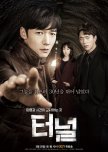
A Captivating Time-Travel Thriller...
Although the element of time travel caused controversy after its release, OCN’s ‘ Tunnel’ should not be mistaken as a ‘ cheap imitation’ or a ‘ copycat ‘ of tvN’s successful production ‘Signal’. In fact, apart from the tenuous links between both shows being loosely based on the real-life South Gyeonggi serial killer case( and of course the element of time travel fantasy) ,the storylines are derisively different.Tunnel focuses upon a 1980s detective called Park Gwang Ho ( played by Choi Jin Hyuk). Desperately trying to catch a serial killer murdering women in hope of protecting his wife , he chases the killer through a tunnel, and when he comes out the other side he finds he’s been transported 30 years into the future and is in 2017. As the killer he’s been chasing resumes his killing spree in this future time zone, Gwang Ho assumes the identity of a young policeman and works with new colleagues, including his efficient partner detective Kim Sun Jae (played by Yoon Hyun Min) and their icy criminal psychology consultant Shin Jae Yi (played by Lee Yoo Young), who will hopefully help him to catch the killer.
Perhaps the greatest thing to note about “ Tunnel” is through its ability to develop characters without airbrushing over their intrinsic flaws over the course of the series.
Although Choi Jin Hyuk is a brilliant actor, his character Gwang Ho undeniably appeared as a little off-putting
for viewers to truly warm-up to at first. Gwang-Ho is austere, abrupt and sardonic ; very much a product of his time. Often, he often locks horns with the younger and tech- savvy detective Jae Yi over his old-school methods.
Ultimately, however, Gwang Ho has a kind-heart and strong moral drive- a man of duty who is desperate to get back to his wife. Perhaps the one thing which often struck me as a little odd about Gwang Ho as a character can be found within his interactions with the modern world. He does undeniably struggle with the sudden changes thrown in front of him, yet certain reactions towards technology often seemed a little lacklustre. Yet is still remains that as a main character, side characters such as Kim Sun Jae (played by Yoon Hyun Min) and Shin Jae Yi (played by Lee Yoo Young) notably had greater character-depth.
Sun Jae went from an aloof and reserved detective, to a resound team player who learns to finally heal his emotional wounds in the process . His partner Gwang-Ho is his complete opposite, leading an oddly comical rivalry between the two characters. Refreshingly, however, Sun Jae wasn’t pushed into this stereotype as the ‘' comic relief''- he is a character with his own profound and interesting backstory, which naturally slots in without feeling disjointed or odd at all in the overarching storyline .
On the other hand, Jae Yi was a character who noticeably did not change by new revelations coming to light, but rather coming to accept the truth in the process . She is still an eccentric professor in the ending of the series but she is certain upon confronting her past and identity. Her relationship with Sun Jae can be seen as a little and awkward in the grand scheme of the setup of the show, due to the striking personality differences between both characters and its presence in a thriller drama . Nevertheless their relationship did arguably over an intrinsic sense of closure for Jae Yi, as she is able to escape her fears of the past.
In addition to the odd alliance and partnership between the trio, there is the more light-hearted dynamic between n Kwang Ho and Sung Shik (Jo Hee Bong) who was a rookie detective under Kwang Ho is the past, but in the present, he is Kwang Ho’s team leader and now older than him. Of course, this naturally to an onslaught of confused reactions when they begin reverting back to the terms they once used in the past, leading to moments of comical gold as the rest of their team look on in confusion.
The writing, while it took its time laying down some groundwork, intrinsically lead to an interesting storyline. The identity of the killer and the antagonist is naturally the tuning point of the show, however, this was let down slightly by the problem of pacing. This is arguably the show’s greatest weakness due to interesting storyline being reverted by a sense of slow pacing and lacking speeds parts, however, when the show does pick up in certain moments, the aspects of ravaged grief and humanity can easily overwhelm the viewer.
Ultimately, ‘’ Tunnel’’ had a brilliant cast and an intriguing premise, however, it is important to note that this series verges upon heavy-hitting issues typical of any noir such as murder, fatalism and psychopathy on top.
The bittersweet ultimatum of the show will probably leave viewers slightly torn and the pacing does not always help to keep viewers on the edge of their seats. Nevertheless, the characters of the series are a life line for keeping viewers interested and whilst not intrisically flawless, ‘’ Tunnel’’ is certainly a good watch.
Was this review helpful to you?
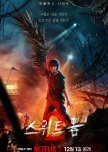
Sweet Home 2; Is It A ‘ Sweet’ Sequel?
Like most drama fans and readers of Sweet Home, I was a little hesitant hearing about a sequel season to the original series. While the original series was interesting ( though a little flawed) in its own ways, deviation can often be a rocky road and has been proven especially in recent months with sequels to beloved shows .
However, Sweet Home 2 surprisingly took onboard someone of ite faults to create something which was very different from its original source. Is this a bad thing per say? No. In fact, director Lee Eung Bok really did seem to have fun with world-building outside of the apartment complex and introducing new and potentially compelling characters. Did it make the second season feel a bit like a filler before the finale season? Yes, it did a little. (For those who haven’t seen season one, I will try my best to keep this spoiler free but be warned in saying I will be comparing some characters and referencing general knowledge from both seasons. )
Season two picks up pretty much where season one left off. Now facing seperate threats, Hyun Su ( Song Kang) and the surviving Green Home Apartment residents
find that there are worst things than monsters outside of the apartment complex...
Season two is arguably a lot more action-orientated than the original season and source material which definitely has its advantages and disadvantages. On one hand, the series had a feeling of an adrenaline rush, while also being able to be engaging enough for audiences to see new characters introduced. However, while I do praise the series for showing us more versatility in fights and powers of some of the monsters and characters , it was noticeable that the sequel was lacking a little in something which made the series feel more rushed than in season one; suspense and tension.
Evidently with a new setting and place, it was apparent to see Lee Eung Bok trying to take a leaf out of dystopian works such as The Last of Us and Resident Evil in some of the more apparent world-building, disturbing creatures , combat and characters onscreen. However one thing which made both pretty successful in execution as horror-dystopian works came through a good balance between dreading suspense and action.
Sweet Home 2 often seems to struggle a little with attaining this balance. A creature would often come out, mass hysteria and fighting ensues then that’s pretty much it. ( Though praise in a few scenes in the show which allowed some more moral questions to come through .)
While it’s fun to have some action scenes, it’s fair to say most viewers probably were expecting a lot of what was going to happen before it did. When the series did try and surprise us, it rarely had a great impact as a result.
Ironically while season one often struggled with the opposite issue ( not enough adrenaline at times), it did attain one element right by creating tension. Alongside Hyun-Su, you were never entirely sure what was going to await your eyes when he turned a corner or opened a door and you found yourself on edge in a way season two could not quite replicate. Hopefully season three will be able to find a middle ground between both past seasons.
Going into one of the major topics of Sweet Home Season 2 comes through acting and character writing. On the acting front, Sweet Home 2 is fairly good. There are certainly a few wooden deliverances here and there, but there are some particularly outstanding performances by Jung Jin-Young as soldier Park Chan-young, Kim Si-a as the mysterious child, Go Min Si as Lee Eun Yoo and of course, Lee Jin Wook as Pyeon Sang wook.
Character writing was a bit of a mixed bag. On one hand there’s a lot of really interesting characters introduced in the series. However at the same time, it felt as though Sweet Home 2 overcommitted a little to introducing too many characters at once and not enough time to develop both original characters and newcomers alike.
Lee Hyun Su is a classic example in the series. As the actual protagonist and considering how much he went through in the first season, Hyun Su has very little screen time. On one hand, this does seem to be purposeful as the second season did seem more focused drawing upon external forces and how this will influence the later course of the plot. However at the same time when the writing tries to really make us feel or emphasise with his struggles, it didn’t really land as well because we had not really seen or explored how his character had grown onscreen and in the sudden time skip also.
Lee Eun Yoo and Sang Wook, familar faces from season one, go through quite a significant character change in season two which was an engaging part of the story. However similar to Hyun Su, they aren’t really given enough time to be developed onscreen. A lot of the original residents are often put on the back burner a little when it comes to some of the new characters.
Newcomer Park Chan-Young is a really engaging character who arguably had one of the most interesting motives in the series. While he did suffer from lack of screen time, hopefully season three will allow him more character development. Similarly, the mysterious child and Chief Ji (Kim Shin-rok), two of the show’s biggest potential plot points,were underdeveloped but could be explored more next season.
While there are definitely some interesting new characters, there are some very debatable ones introduced such as Hani (Chae Won-bin), Ho-sang (Hyun Bong-sik) and Ye-seul (Yang Hye-ji). Ye-Seul isn’t particularly a bad character per say and is used mainly in the show for some laughs. However, she is never really given anything beyond being the comic character despite being quite heavily featured in some scenes and shown to have a significant character relationship. On the other hand Hani and Ho-Sang are a little more convoluted. They are meant to be more antihero figures in the series, but rather than having more morally ambiguous roles or counteracting what characters think of them, they often play into being downright problems for the plot. In addition to this, anything to do with their relationship or even backstory is pretty much brushed over completely.
The execution of the series is definitely very fast in parts, and slower in others for introducing characters or some exposition, but does struggle with feeling very rushed. This is odd conserving how much time the series could have spent building on its two main plot lines. Although it’s apparent the series was trying to get through as much plot as possible, this was none so more apparent than in the time skip in the final few episodes. Is it bad to have a jump forward? No. Did it mean the series thought it was a solution for not seeing some plot holes and relationship growth? Yes, very much so.
The cinematography has definitely improved since season one with more varied palettes and sets. The CGI does still seem a little awkward in parts, but has improved also since the original season.
Overall Sweet Home 2 finds itself is definitely a slightly odd position . It has improved a lot of the graphics and world building as well as setup an engaging plot and characters, but still struggled with some writing and pacing issues which could have been easily fixed. Overall a fairly engaging watch as well as enticing for setting up the final season.
Was this review helpful to you?
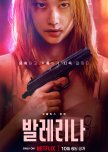
Ballerina; A Messy Pirouette Marked With Blood…
2023 has seen a great lineup of action thrillers, especially with strong heroines and Ballerina certainly tries to follow suit. However while did have some heavy action scenes and subjects, was it really a worthwhile watch?
Lee Chung Hyun directed and wrote the movie. Ok Ju ( Jeon Jong-seo) is a bodyguard who holds her own in fights. However, her life turns upside down when she discovers her friend and ballerina Min-hee (Park Yu-rim)’s fatal aftermath in the wake of being sexually assaulted by mid-level boss Choi Pro (Kim Ji-hoon).
Now seeking her revenge, she is put on a bloody path to enact vengeance on Choi Pro and his cronies by ending him once and for all.
It’s suffice to say Ballerina is very much what it says on the tin; a revenge movie where the heroine gets revenge by tracking down the big bad and leaving a wake of carnage in her way. The film is gory and filled with adrenaline, but that’s about it.
This isn’t necessarily bad. A lot of revenge and action films work on the premise of mindless violence to keep viewers engaged and it was evident to see the film’s influences from John Wick to Kill Bill. However, Ballerina never really gives us full scope that it tries to do with its characters and plot. It always tethers on potential development before tearing it away to focus on a fist fight and action scene.
The problem is that doesn’t really give the narrative or characters a lot of backbone. Even some of the most disturbing revenge Korean films over the past few decades such as Oldboy, Lady Vengeance and Burning are able to balance out their narratives with adrenaline, and tension, but equally compelling storylines and choreography. In Oldboy, we see plot twist development shock us beyond belief, Lady Vengeance is filled with complex characterisation and compelling fight scenes, while Burning explores tension and thematic issues such as capitalism in its core narrative . The problem with Ballerina is that while it doesn’t have to be a complicated movie at heart like some of its predecessors , it struggles with simple basics such as characterisation and development.
Jeon Jong-seo is a good actress but her character Ok Ju is very paper-thin. The audience never have any opportunities to warm up to her. It seems quite ridiculous when we consider the fact that we’ve seen Jong-seo lose a close friend and numerous hardships, yet we never see this develop or understand how this is such a devastating impact for her character. We do see some flashbacks to understand their relationship but this felt a little convoluted than explained or poignant, lacking a lot of potentially sincere emotional development. Sure, she’s a certified pro- fighter and brutal, but that’s pretty much in the space of this movie’s duration, all we get from our heroine’s character.
It was Kim Ji hoon’s role as Choi Pro which did shine through here. His cartoonish heinousness did help during some of the more questionable pacing and writing issues, by at least giving some appeal for the audience to root for the heroine.
The pacing is pretty variable in parts. When the action comes into force, it’s quick and adrenaline rushes. Yet in its patchy narrative and writing moments drawn out for sobs or seeming development, the gaps in writing often make these scenes drag out longer than they should.
Naturally, action choreography and actions scenes are where Ballerina excels. Lee Chung-hyun’s direction is simultaneously ultraviolent yet sleek. Its mesmerising to watch with the pure adrenaline of movements and camera angles really bringing these scenes to life.
Ballerina is a fairly mindless action movie. While probably not one of the best films released this year or winning over fans of revenge action films and cult classics, it is adrenaline infused and brutal. The writing is patchy but it’s well-directed through its camera angles and the fight scenes are well-executed also. Overall probably decent enough to watch one time when bored or killing time and that’s about it.
Was this review helpful to you?























